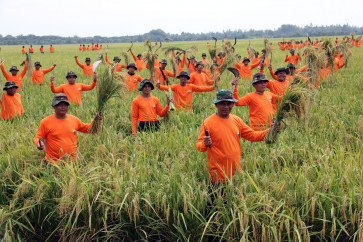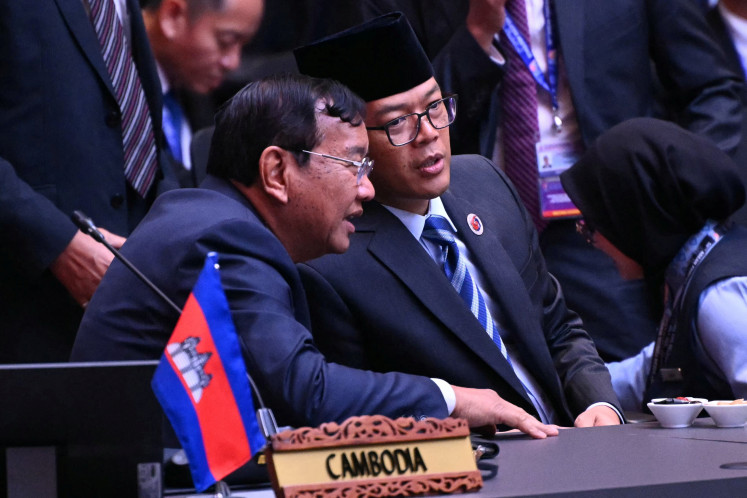Popular Reads
Top Results
Can't find what you're looking for?
View all search resultsPopular Reads
Top Results
Can't find what you're looking for?
View all search resultsNadya Fadila Saib: An 'accidental' entrepreneur empowers rose farmers
(JP/Stevie Emilia)For social entrepreneur Nadya Fadila Saib, an âaccidentâ can turn into a happy coincidence
Change text size
Gift Premium Articles
to Anyone
(JP/Stevie Emilia)
For social entrepreneur Nadya Fadila Saib, an 'accident' can turn into a happy coincidence.
In her college days, Nadya and her two friends, now all pharmacists from the Bandung Institute of Technology (ITB) in West Java, began to investigate natural cosmetics, focusing on natural soaps.
'We, with our 'we-know-best attitude', wondered how come many products claiming to be 'natural' contained many unnecessary chemicals inside,' the 27-year-old said.
Out of concern over the absence of regulations to control natural products, the three ' Nadya, Amirah Alkaff and Fitria Muftizal ' then chipped in Rp 500,000 (US$41) to make bars of soap from ingredients like apples, turmeric and olive oil.
Their soap bars, produced using simple tools, were then distributed for free among friends and families.
'We definitely didn't use animal testing, but family testing,' laughed Nadya, recalling their first batch of soap bars.
They got plenty of feedback, complaints that the soap was too soft or not smooth enough, encouraging them return to the drawing board to find the perfect formula.
After winning a grant from the Education Ministry through its student entrepreneurship program in 2009, they bought better tools and started producing more bars of soap.
It was then that Wangsa Jelita ' their company name literally means 'beautiful dynasty' ' was born.
'When starting up Wangsa Jelita, the idea was simple ' we wanted to work on something that we loved,' said the recipient of the prestigious ASEAN Youth Award 2012 -- recognition for her outstanding contribution to ASEAN Youth.
Her interest in beauty products began in high school, when she first began to experiment with cosmetics.
'But since I'm more into products, I thought being a pharmacist was the best option for me, not dermatologist,' said the youngest of three siblings.
She found her calling with Wangsa Jelita, whose products can be found online and through resellers.
With production rising, the three soon came up with the idea to create soap from something that people could easily relate to Bandung in strawberries.
Strawberries are farmed widely around Lembang on the outskirts of the city.
When visiting Lembang, however, they met Agriculture Ministry staff holding a workshop for rose farmers.
They soon discovered that unlike strawberry farmers, who had little problem selling their fruit at fair prices, there was a stark gap between the price being charged by rose growers and that being charged by middlemen.
Twenty A-grade roses, which have the longest stems, are priced at Rp 40,000, while the lowest C-grade rose sells for Rp 15,000.
Roses are only in demand on several occasions, like during graduation or Valentine's Day.
And so the 'accident' happened and they decided to switch to roses instead strawberries
'So, I call this circumstance a 'happy accident',' Nadya told participants at the recent Makers of More Summit in London.
She was one of five social entrepreneurs to share their inspiring stories at the summit, jointly organized by Ashoka, an organization that has a three-decade-long history of identifying and investing in leading social entrepreneurs, and the Arthur Guinness Fund (AGF), a global nonprofit initiative from Guinness.
In 2010, they decided to turn their profit-oriented business into a social enterprise, or business that turns a profit but reinvests the majority back into social missions.
'We apply fair-trade practices with local communities, paying them for their hard work with a fair price,' said Nadya, who has also been selected to join the Global Shapers Community ' an initiative of the World Economic Forum, which is a network of hubs developed and led by young people exceptional for their contributions to their communities.
They bought C-grade roses at A-grade prices, using the petals to produce a wide range of personal care products ' from soap bars and body lotions to scrubs ' for both high-end and mass-market customers.
Nadya said when the rose farmers learned the petals could be used to make soap, they were surprised.
'The farmers were asking us whether tomatoes worked as well, or even cabbage. They were not joking. They really wanted to know if it was possible for the portions of their tomato or cabbage harvests that could not be sold.'
With the support from the AGF and its partner, the British Council, Wangsa Jelita has provided an alternative market for rose farmers, giving them more bargaining power against middlemen.
By selling their pro-duct to middlemen, rose farmers have little direct access to markets and possess limited commercial skills. This allows roses to be bought at under-market prices, eating away at potential profits for farmers.
With the cooperation, the Wangsa Jelita team contributes marketing guidance and farmers make their own operational decisions. A mutual agreed-upon arrangement is also established to ensure equitable profit-sharing.
Through it all, farmers acquire their own community-based social enterprise; incomes rise, jobs are created, new skills are gained and farmers have the freedom to remain independent.
Nadya said Wangsa Jelita offered products based on authentic natural concepts, disclosing every ingredient while at the same time sharing knowledge about what constitutes a 'real natural concept'.
Currently, she is working on improving brand awareness and soon, she hopes to sell Wangsa Jelita products at her very own store.
She said she dreamed that the company could become a social enterprise that sets the gold standard for natural beauty-care products ' and along the way, create a beautiful dynasty, just like Wangsa Jelita's name means.
'And just remember that the 'happy accident' that happened to me can happen to you too.'










